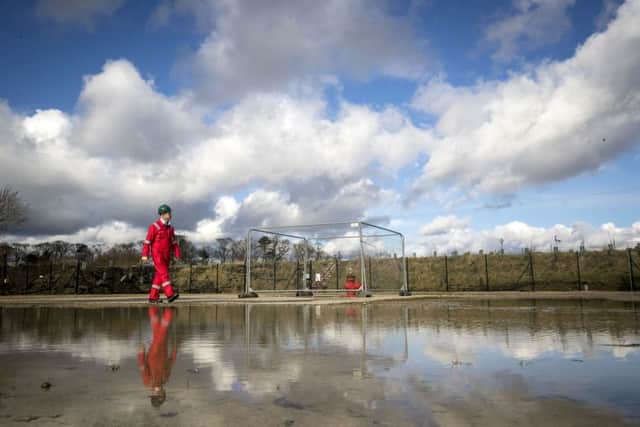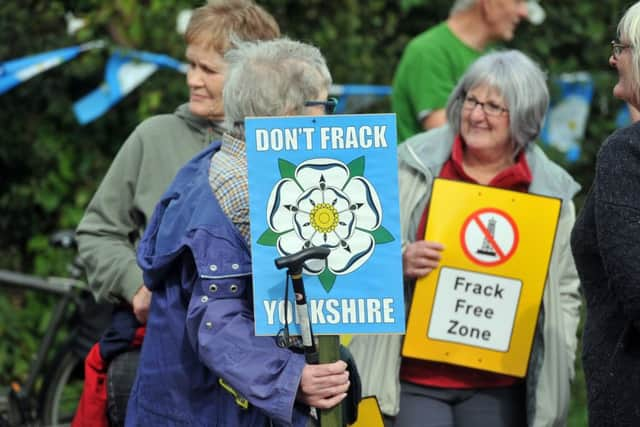Why Yorkshire’s fight on fracking is far from over
On the surface, calm has returned to the picturesque village of Kirby Misperton after it became a frontline in the national battle over fracking two years ago with dozens of protesters arrested as they tried everything from jumping on lorries to encasing their arms in concrete and metal tubes and lying on the ground in an attempt to prevent it becoming the site of the first frack for shale gas in the UK for years.
But while the dramatic demonstrations have disappeared after Third Energy, the Barclays Bank-backed company behind the plans, moved fracking equipment off-site in early 2018 following the Government ordering a “financial resilience” review before allowing test drilling to take place - the fight over both the future of the site and fracking in Yorkshire is very much continuing, but this time on a legal and political battlefield rather than through confrontations on a country lane.
Advertisement
Hide AdAdvertisement
Hide Ad

Fracking is a process in which liquid is pumped deep underground at high pressure to fracture shale rock and release gas or oil trapped within it. Supporters, including the Government, argue it represents a huge opportunity to reduce the UK’s growing reliance on overseas energy imports with an area covering Yorkshire and Lancashire known as the Bowland Shale described as the biggest shale field in the world. But the industry has been on the defensive in recent months as public opposition has grown over concerns about its impact.
This week, fracking firm Cuadrilla announced it was making “goodwill payments” to homeowners in Lancashire who had reported property damage after a 2.9-magnitude tremor at its site in August - over 250 times the 0.5-magnitude limit set by the Government, part of a series of earthquakes since fracking there started in October 2018 and one which resulted in the process being suspended indefinitely at that location.
Advertisement
Hide AdAdvertisement
Hide AdFracking is also expected to be a key election issue, with Labour and Liberal Democrats promising to ban the process and Prime Minister Boris Johnson - who has previously supported fracking and once went as far as describing it as “glorious news for humanity” - hinting on Wednesday a ban could even be imminent after talking in Parliament of “the very considerable anxieties that are legitimately being raised about the earthquakes that have followed various fracking attempts”. It came after the Conservatives were criticised for the involvement of Rachel Wolf, a lobbyist who has represented Cuadrilla, in writing their forthcoming election manifesto.


While Cuadrilla’s work in Lancashire has grabbed the headlines, the issue has not gone away in Yorkshire where six companies have licences to carry out exploratory work. Third Energy’s work was the most advanced, with the company spending millions developing its Kirby Misperton site in preparation before the financial review led to test work being put on hold.
But focus on the future of the Kirby Misperton site was revived earlier this year as new American owners took over Third Energy’s onshore operations through a new firm called York Energy, a subsidiary of US investment firm Alpha Energy.
The move has led campaigners to seek a judicial review of an alleged “failure to act” by industry regulator the Oil and Gas Authority in preventing the takeover. Lawyers representing anti-fracking activist Eddie Thornton have now begun efforts to start such a process after a crowdfunding campaign to back the legal challenge raised over £10,000. Their case argues that Third Energy and York Energy should have sought the consent of the OGA before the takeover, while also questioning the adequacy of financial checks on York Energy.
Advertisement
Hide AdAdvertisement
Hide AdThornton believes his case has been given fresh momentum by last week’s publication of a report by the National Audit Office on fracking which raised concerns about confusion surrounding who foots the bill for the costs of decommissioning fracking wells - a process which can cost up to £1m - should an operator go out of business.
“Barclays were the parent company of Third Energy before and they had billions behind them. This new company was registered with £10 in the Cayman Islands,” he says.
“By not properly scrutinising the takeover of Third Energy, the regulator has broken its own rules and put the public at huge financial risk. If our challenge is successful in court, the only remedy I can see is the revocation of Third Energy’s licence, which would mean our community is no longer under threat from fracking.”
He believes the case could have “massive implications” should his legal challenge prove successful and potentially lead to tighter financial regulation of fracking companies or force them to put down bonds covering decommissioning costs before they begin operations.
Advertisement
Hide AdAdvertisement
Hide AdThe OGA is due to respond next week to the legal action ahead of a court determining whether a judicial review should take place. The OGA has told The Yorkshire Post it does not comment on ongoing legal matters but it is expected to argue it has acted properly in the matter.
Alan Linn, the chief executive of Third Energy Onshore, takes a more forthright view of the potential judicial review. “We believe there is no legal issue at all. It basically flying a kite, there is nothing in it,” he says, adding the company is making money from producing conventional gas and has long-term aspirations to start fracking at six of its eight sites in the area.
“We are producing revenue and gas at the moment, we are generating power every day. Our finances prior to the purchase were showing a fairly large negative number but that was because we were being funded by Barclays who were investing money in the company to better understand what the unconventional gas [fracking] potential was under the Vale of Pickering. It was not a loss, it was an investment. That investment demonstrated a very large reserve under North Yorkshire and that is something of considerable interest to York Energy. Clearly, there are some challenges to accessing it commercially. We will eventually work through these and get there. We want to be a good neighbour and be here for the next 50 years.”
Fracking companies such as Ineos have been calling on the Government to alter its rules on earthquakes, which forces fracking to be stopped for 18 hours if work triggers a tremor higher than 0.5 magnitude. Linn says there is “no question” it has been a challenging time for the fracking industry, he believes it can still have an important role to play in UK energy generation if there is a change in legislation to make the industry more commercially viable.
Advertisement
Hide AdAdvertisement
Hide Ad“We are not planning to frack any time soon, we need to make sure when we do we can move ahead with the commercial business. While we are waiting for that set of regulatory and economic circumstances, we will continue with our current conventional business.”
Linn says the company will continue to produce conventional gas at its North Yorkshire sites including Kirby Misperton but remains interested in getting fracking started if possible.
“We will develop that gas at a point in time when all the regulations line up and the current issues with seismicity are resolved to everybody’s satisfaction. We can develop those resources for the country but we don’t want to be investing money that we can’t get a return on.
“We have got eight sites in the Vale of Pickering. Six of them are potentially viable for fracking - there are two in the North York Moors which wouldn’t be.
Advertisement
Hide AdAdvertisement
Hide Ad“We work closely with the regulators and will continue to. Our business is exploring, developing and producing gas and we do it very successfully, we don’t get any subsidies and we have for to go out and get funding for the business to do the work we want to do.”
Linn says he believes that fracking can actually be “part of the solution” for tackling climate change.
“There is a lot of uncertainty at the moment about what Britain really needs. To get to carbon neutral by 2050, it needs local domestic gas.”
While groups such as Friends of the Earth have suggested the situation in Lancashire should spell the end of attempts to get the fracking industry off the ground in England, Linn sees things in a very different light.
Advertisement
Hide AdAdvertisement
Hide Ad“I don’t think fracking has been proven to be unsafe at all. The kind of seismicity we are talking about, even in the most recent seismic event in Lancashire, is nothing compared to a train going past or a lorry going past you on the street. I’m very comfortable we are in a situation where we can undertake our activities and we wouldn’t be any more intrusive than somebody who is building a house half-a-mile away from you. On the surface it is the same.
“It is much less intrusive than coal-mining ever was and people have lived over coal-mining areas for a couple of hundred years.”
Although the future of fracking in England looks increasingly doubtful, Linn is insistent that Third Energy - and its intention to extract shale gas from under the ground in North Yorkshire - are not going anywhere.
“Maybe the time is not right to move ahead today. It might be a year or two years. In the meantime, we have got a business that generates power.”
Public support dropping for fracking
Advertisement
Hide AdAdvertisement
Hide AdGovernment research has found public opposition to fracking has almost doubled in the past six years.
Surveys have found 40 per cent of people against it, up from 21 per cent in 2013. Those indicating support for the process has dropped from 27 per cent to 12 per cent.
Anti-fracking campaigner Eddie Thornton says: “I think the fracking industry have lost. Public opinion is now so far against them. There has been a huge rise in public awareness of climate change in the past few years and the whole discourse has changed.”
He also took issue with Linn’s description of tremors being comparable to trains and lorries. “Cuadrilla are paying out compensation. I don’t think you get that with a passing train.”